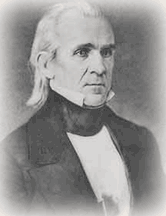James Knox Polk was born in Mecklenburg County, North Carolina, the eldest of 10 children. His family moved to Tennessee, in 1806. Despite ill health and little formal schooling in his early years, Polk managed to graduate from the University of North Carolina with honors in 1818.
 He studied law under Felix Grundy, the leading lawyer in Nashville, then began practice on his own in 1820. He quickly turned to politics and was elected to the state legislature in 1823.
In 1825, Polk was elected to the House of Representatives from Tennessee and served in Congress until 1839, the last four years as Speaker. Polk was a leader of the Jacksonian loyalists and was especially helpful to the president during the Bank War.
Democrats took much of the blame for the depression that followed the Panic of 1837. Polk returned to Tennessee and was elected governor in 1839, but was defeated in two succeeding elections.
Polk emerged as the dark horse Democratic candidate in the Election of 1844, edging out Henry Clay. The campaign was dominated by two expansionist issues — the annexation of Texas and the occupation of Oregon.
The question of the Annexation of Texas was settled before Polk took office, when Congress passed a joint resolution and President Tyler signed it into law with three days remaining in his term. In his inaugural address, Polk referred approvingly to the annexation, which he termed "re-annexation" based on the dubious theory that Texas had previously belonged to the United States:
He studied law under Felix Grundy, the leading lawyer in Nashville, then began practice on his own in 1820. He quickly turned to politics and was elected to the state legislature in 1823.
In 1825, Polk was elected to the House of Representatives from Tennessee and served in Congress until 1839, the last four years as Speaker. Polk was a leader of the Jacksonian loyalists and was especially helpful to the president during the Bank War.
Democrats took much of the blame for the depression that followed the Panic of 1837. Polk returned to Tennessee and was elected governor in 1839, but was defeated in two succeeding elections.
Polk emerged as the dark horse Democratic candidate in the Election of 1844, edging out Henry Clay. The campaign was dominated by two expansionist issues — the annexation of Texas and the occupation of Oregon.
The question of the Annexation of Texas was settled before Polk took office, when Congress passed a joint resolution and President Tyler signed it into law with three days remaining in his term. In his inaugural address, Polk referred approvingly to the annexation, which he termed "re-annexation" based on the dubious theory that Texas had previously belonged to the United States:
The Republic of Texas has made known her desire to come into our Union, to form a part of our Confederacy and enjoy with us the blessings of liberty secured and guaranteed by our Constitution. Texas was once a part of our country—was unwisely ceded away to a foreign power—is now independent, and possesses an undoubted right to dispose of a part or the whole of her territory and to merge her sovereignty as a separate and independent state in ours. I congratulate my country that by an act of the late Congress of the United States the assent of this Government has been given to the reunion, and it only remains for the two countries to agree upon the terms to consummate an object so important to both.Polk as president surprised many by his independence and hard work. He announced four goals for his administration: